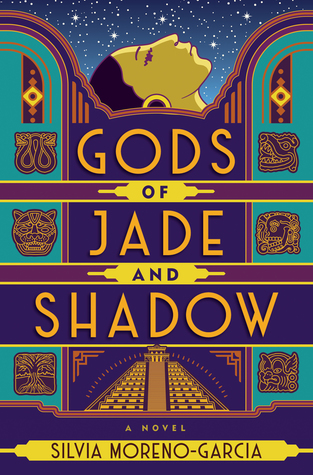- The Good: Fairy tale featuring the Mayan god of death, 1920’s Mexico, and a journey to the underworld Xibalba
- The Bad: Omniscient POV and simple prose
- The Literary: Mayan mythology and Spanish poetry
Casiopea Tun dreams of a life of dancing and fast cars, but she’s stuck running errands for her entitled cousin Martin and cleaning the floors of her wealthy grandfather’s estate in a small town in the Yucatan. As the ‘poor relation’, Cassiopeia’s mother disgraced the family by eloping with Cassiopeia’s dark-skinned indigenous father, then had no choice but to return to her family when her husband died. But when Cassiopeia opens a wooden box in her grandfather’s room, she accidentally frees the Mayan god of death Hun-Kame, who then binds himself to her and together they embark on a mission to recover his throne from his usurping brother.
I am a sucker for fairy tales, and this Mexican folklore-inspired story piqued my interest, especially when it was made a Goodreads Choice Award nominee for Fantasy in 2019. I love how vivid and colorful the explicit details are in this quest narrative, from the evolving setting of Mexican cities in the Jazz Age, including demons and sorcerers and evil spirits, to the defiant protagonist, to the quiet doomed romance between a god and a young woman.
The fast-paced story and well-timed plot is executed quite well. When Casipoea touches the skeleton of the god, a shard enters her finger, and the entire plot is propelled forward by the transference of godhood and mortality, which will ultimately drain Casipoea of her mortality and kill her. When Vucub-Kame, Hun-Kame’s brother, enlists Casipoea’s cousin Martin to his side, the stakes rise.
Unfortunately, the omniscient point of view detracts from the intimacy between the reader and Casipoea, and all of the characters really. The excessive use of telling instead of showing does read as fairy tale, but feels wrong here. The point of view, combined with simple prose, evokes the feel of a book designed for a younger audience, even though it’s billed as adult.
If you love Naomi Novik’s Uprooted, read this next! Recommended for fans of coming-of-age fairy tales!
‘’Words are seeds, Casiopea. With words you embroider narratives, and the narratives breed myths, and there’s power in the myth. Yes, the things you name have power.’’
